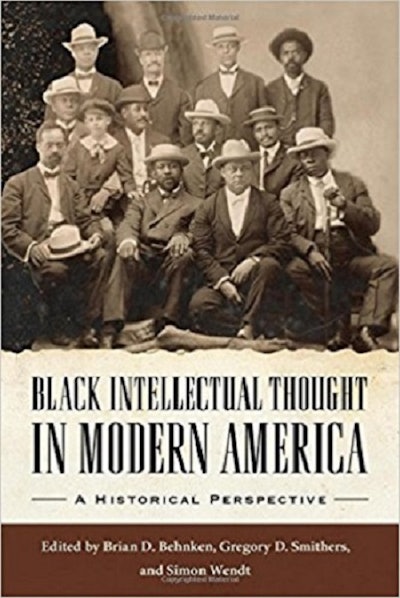Black Americans are frequently regarded as a monolithic group that thinks, votes and worships the same way. Black scholars have worked to dispel this myth by pointing out the range and complexity of Black American experiences. Black Intellectual Thought in Modern America: A Historical Perspective is an edited volume that explores the diversity of Black intellectual thought. It includes an introduction and seven essays that highlight particular aspects of Black scholarship in America.
The editors’ introduction surveys the essays in the volume and sets out the aim of the project, which is “to complicate how Black intellectualism is academically and popularly understood.” They say their intention is to avoid the reductive generalizations and simplistic binary categorizations that frequently have characterized Black intellectual historiography.
Gregory D. Smithers writes a sweeping overview of Black intellectual thought in “‘All the Science and Learning’: Black Intellectual History in the United States.” Smithers acknowledges the medicine men, priests and conjurers who were keepers of wisdom traditions during slavery. Then, he surveys the work of major Black thinkers in the 18th and 19th centuries and their participation in efforts to abolish slavery in the U.S. He identifies the roles of Black intellectuals in addressing continued struggles following the ratification of the 13th, 14th and 15th Amendments to the U.S. Constitution, the challenges of Reconstruction and battles against Jim Crow segregation.
In “Black Marxism,” Minkah Makalani discusses the Black Marxist tradition beyond its links to the history of the Communist Party of the United States of America. Makalani seeks to resist standard narratives regarding Black radicalism that tend to focus on Black engagement within the context of other movements or schools of thought. He illustrates that Black Marxists have not treated race as simply one element within a larger class struggle but have intentionally addressed the coexistence and relationship of issues of race and class.
Danielle L. Wiggins discusses the rise of conservatism among Black Americans in “Black Conservative Thought in the Post-Civil Rights Era.” Wiggins includes a variety of thinkers, from poet Jupiter Hammond and educator Booker T. Washington to comedian Bill Cosby and economist Thomas Sowell. Wiggins also notes former President Barack Obama’s emphasis on self-improvement and personal responsibility when addressing Black audiences.
Simon Wendt’s piece analyzes Black nationalist thought by Black paraintellectuals. These are Black thinkers who are typically activists and organizers outside academia and mainstream intellectual circles. Wendt addresses their relationships to mainstream intellectual traditions, their understandings of racialized oppression as a form of colonization and the gendered nature of their work. Wendt’s postcolonial approach offers a new lens to view the complexities of Black nationalism and makes space for activist intellectuals within Black intellectual traditions.
The standout contribution in this volume is Benitha Roth’s piece on Black feminist intellectuals and Black feminist theory. Roth explains that, historically, Black women activists and intellectuals have understood the importance of addressing multiple and interlocking forms of oppression. Roth provides a helpful overview of Black women’s work within U.S. communist organizations, the civil rights movement, later Black liberation and feminist movements and today’s Black Lives Matter movement.














